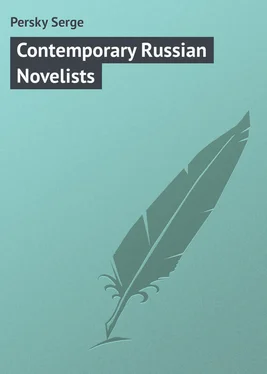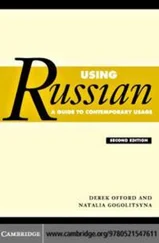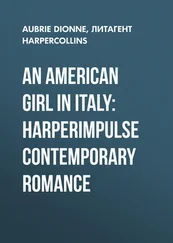Serge Persky - Contemporary Russian Novelists
Здесь есть возможность читать онлайн «Serge Persky - Contemporary Russian Novelists» — ознакомительный отрывок электронной книги совершенно бесплатно, а после прочтения отрывка купить полную версию. В некоторых случаях можно слушать аудио, скачать через торрент в формате fb2 и присутствует краткое содержание. Жанр: Русская классическая проза, на английском языке. Описание произведения, (предисловие) а так же отзывы посетителей доступны на портале библиотеки ЛибКат.
- Название:Contemporary Russian Novelists
- Автор:
- Жанр:
- Год:неизвестен
- ISBN:нет данных
- Рейтинг книги:3 / 5. Голосов: 1
-
Избранное:Добавить в избранное
- Отзывы:
-
Ваша оценка:
- 60
- 1
- 2
- 3
- 4
- 5
Contemporary Russian Novelists: краткое содержание, описание и аннотация
Предлагаем к чтению аннотацию, описание, краткое содержание или предисловие (зависит от того, что написал сам автор книги «Contemporary Russian Novelists»). Если вы не нашли необходимую информацию о книге — напишите в комментариях, мы постараемся отыскать её.
Contemporary Russian Novelists — читать онлайн ознакомительный отрывок
Ниже представлен текст книги, разбитый по страницам. Система сохранения места последней прочитанной страницы, позволяет с удобством читать онлайн бесплатно книгу «Contemporary Russian Novelists», без необходимости каждый раз заново искать на чём Вы остановились. Поставьте закладку, и сможете в любой момент перейти на страницу, на которой закончили чтение.
Интервал:
Закладка:
The Damocles' sword of defiant authority was suspended over the head of every Russian writer. The vocation of literature was filled with danger and brought about actual tragedies in some families. Thus, Pushkin's father, fearing that the fury of the authorities would extend to him, began to hate all literature, and had serious quarrels with his son. Griboyedov's mother threw herself at her son's feet and begged him not to write any more but rather to enter the service of the State. In Griboyedov we have a sad example of a great talent virtually buried alive by the censor. His comedy, "Intelligence Comes to Grief," is a masterful work, sparkling with satiric warmth, the equal of which it would be hard to find anywhere. This first work, rich in promise, was never published nor produced. Discouraged, the author renounced literature, and on the advice of his mother, accepted a position as ambassador to Persia, where he was killed in a riot.
Not only does the censorship mutilate literary works, but it often suffocates the inspiration of the author. The Russian press has lately published a very interesting article on Nekrasov, explaining the frequent interruptions of his activity by a momentary paralysis of his inspiration. Often, he writes, the ideas and poetic forms which come to his mind are so strong that he need only take up his pen and write them down. But the thought that what he might write would be condemned by the censor, stops him. It was, then, a long struggle between the ideas which he wanted to express and the obstacles which hindered him. And when finally Nekrasov had smothered his inspiration, he was broken down and crushed by fatigue and disgust, and for a long time he stopped writing. His friends advised him to jot down his ideas in spite of all, in the hope that they would be recognized by future generations when happier days should dawn on literature. He was not successful, because in order to create his genius needed to feel a close bond between him and his readers. Thus the censor carried his brutal hand into the very laboratory of thought.
Happily, since the movement toward reform between 1860 and 1870, the Russian censor has become more lenient and now no one says what was once said to the writer Bulgarin: "Your business is to describe public activities, popular holidays, the theatre. Do not look for other topics." The number of subjects open to the press has increased. But the desire to live a free life has developed in literature and in society alike, and as resistance to it has also strengthened, the pressure has remained relatively the same. The censor and the police continue to stifle the natural richness and the power of the Russian mind. To-day, as before, Russian literature is made up of just that small fraction of the whole which has escaped government inquisition.
However, in spite of all the unheard-of constraints which weigh upon her, Russia has already given us such great authors, that we need not hesitate to say that on the day when she regains liberty of speech and of pen, her literature will take its place among the first in the world.
II
ANTON TCHEKOFF 2 2 This spelling has been adopted here, rather than Chekhov, since it is more familiar to the public. In all other cases, the ch and v have been retained.
"There is a saying that man needs only six feet of ground, but that is for a corpse and not for a living man. It is not six feet of ground that man requires, not even an entire estate, but the whole terrestrial globe, nature in its fullness, so that all his faculties can expand freely."
This is the proud profession of faith that Anton Tchekoff made on entering the literary world. He was born January 17, 1860, at Taganrog, where his father, a freed serf, lived. After attending school in his native town, he took up the study of medicine at Moscow. Once a doctor, rather than practise, he devoted most of his time to literature. His career as an author does not offer us any extraordinary situations. He owed his success, and later on his glory, to severe and prolonged work. His literary talent manifested itself while he was still a student. He began his career with humorous short stories which were published in various newspapers. They brought him enough for the bare necessities of life.
These stories have been collected in two volumes. They are very short, almost miniatures. For the most part they are elegant trifles, worked out with painstaking care. One feels that the author had no definite goal in sight; he wrote them simply to amuse and entertain his readers. One would search in vain for any sort of philosophy. On the contrary, one finds there a rather significant spirit, a gaiety, care-free, loquacious and, at times, ironical. Unimportant people tell pleasant things about themselves or others. All these men are a trifle debauched, talky, futile, and their companions are flighty, intriguing little women who chatter incessantly. Everything begins and ends with a laugh. This recalls some of the early works of Gogol, but, we repeat, one finds no moral element in this laughter, and these tiny comedies are in reality no more than simple vaudeville sketches. Once in a while we find a sad note; less frequently, we find the sadness accentuated in order to present a terrible drama. Such, then, are the contents of the first two volumes which came from the pen of Tchekoff.
However, this melancholy little note, met from time to time, gradually grew in intensity in the third volume, until later on it lost all trace of the old carelessness, and developed, on the contrary, into a profound sadness. Tchekoff unconsciously gave up the "genre" of pleasant anecdote in order to concentrate all his attention on facts. This practice made him sad. Russia was, at this time, going through a period of prostration as a result of the last Russo-Turkish war. This war, which, at the cost of enormous sacrifices, ended in the liberation of the Bulgarian people, awakened among the Russians a hope of obtaining their own liberty, and provoked among the younger generation the most energetic efforts to obtain this liberty, no matter what the cost might be. Alas, this hope was frustrated! All efforts were in vain, a reaction followed, and the year 1880 brought the reaction to its height. From then on apathy followed in the steps of the great enthusiasm. All illusion fled. A kind of disenchantment filled all minds. Those who had hoped with such ardor, and had counted on their own strength, felt weak and powerless. Some confined themselves to moaning incessantly. A grey twilight enveloped Russian life and filled it with melancholy. These are the dreary aspects that Tchekoff describes, and none has excelled him in portraying the events of this hopeless reaction. His stories and dramas give us a long procession of people who succumb to the monotony, to the platitudes, to the desolation, of existence.
It is in the following manner that one of his characters expresses his ideas on the subject of this moral crisis:
"I was then not more than twenty-six years of age; nevertheless I was conscious not only that life was senseless, but that it was without any visible goal; that all was illusion and dupery; that, in its consequences and even in its very essence, the life of the exiled on the island of Sakhaline was very much the same as the life that was led at Nice; that the difference between the brain of Kant and the brain of a fly was very small; finally, that no one in this world was either right or wrong."
This idea of the nothingness of life, with its extremes, monstrous and profitless, is often found in the work of Tchekoff. His story "The Kiss" is but a variation of this theme, – the absurdity of life. Lieutenant Riabovich, under the influence of a chance kiss, a kiss that was not meant for him, dreams of love for an entire summer; he waits impatiently for the return of the pretty stranger; but alas, his lovely dream cannot be realized, for the simple and cruel reason that no one is waiting for him , no one is interested in him. One day, on the banks of a stream, the young officer gives himself up to his reflections:
Читать дальшеИнтервал:
Закладка:
Похожие книги на «Contemporary Russian Novelists»
Представляем Вашему вниманию похожие книги на «Contemporary Russian Novelists» списком для выбора. Мы отобрали схожую по названию и смыслу литературу в надежде предоставить читателям больше вариантов отыскать новые, интересные, ещё непрочитанные произведения.
Обсуждение, отзывы о книге «Contemporary Russian Novelists» и просто собственные мнения читателей. Оставьте ваши комментарии, напишите, что Вы думаете о произведении, его смысле или главных героях. Укажите что конкретно понравилось, а что нет, и почему Вы так считаете.












